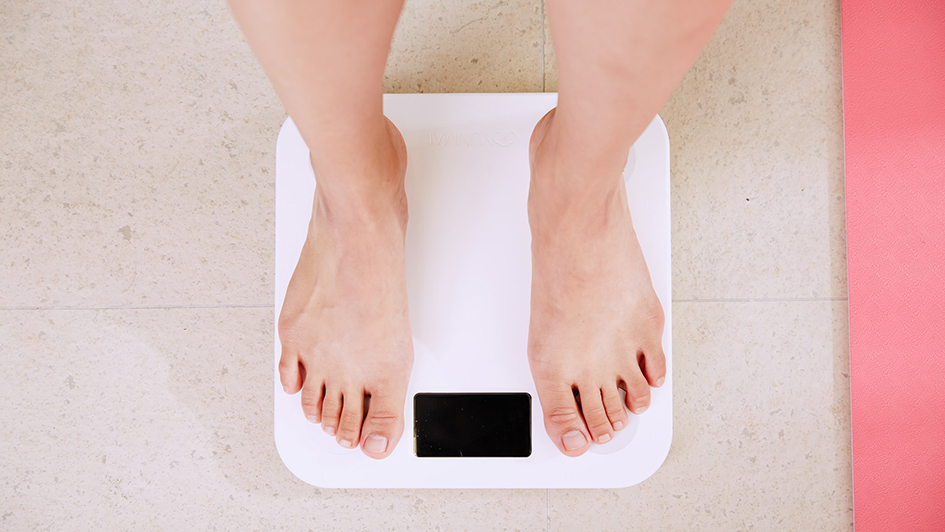
Image: Feet on digital weighing scale. Credit: i yunmai on Unsplash
- Read more in our related news story: Weight gain linked to lower risk of breast cancer before the menopause
We all know that obesity can affect our health. Obesity is the second biggest preventable cause of cancer in the UK. Most of us are aware that staying in a healthy weight range is generally good for our health overall and can reduce our risk of developing cancer.
The reality, though, is that most of us will gain weight over the course of our lives. We may never move into the obese category, but few of us will be the same clothes size aged 40 as we were when we were 18.
Bodies grow and change, we can become less active as we age, our diets can change over time. More than 80% of women will gain weight with age.
The current state of play
Researchers have known for a while that being overweight or obese, especially in early adulthood, seems to have a protective effect against breast cancer diagnosed before the menopause.
Such studies investigated BMI, a measure of your weight compared with your height. It is not a direct measure of body fat, in fact, women with the same BMI can have very different percentages of body fat and body shapes.
Weight gain in adulthood, however, is often a result of increasing body fat. For this reason, the researchers were keen to investigate the effects of BMI in early adulthood and subsequent weight gain in combination.
Researchers at the ICR recently published new research from a large international study, funded by Breast Cancer Now, which shows that women who gained more than 10kg from the age of 18 onwards were found to have a lower risk of developing breast cancer before the menopause than women whose weight stayed stable before menopause.
What’s more – this analysis accounted for the weight women started with. The study showed that for every 5kg a woman gains between ages 18-24 and when she reaches the menopause, there is a 4% decrease in risk of breast cancer.
A relationship between ‘fatness’ and breast cancer risk
Since most of the weight we gain over our lives is likely to be fat, rather than lean muscle, scientists think there is a relationship between the body’s ‘fatness’ and the likelihood of going on to develop breast cancer.
However, what was less well known is that this relationship is different for women before the menopause than it is for women after the menopause.
Dr Minouk Schoemaker, Senior Staff Scientist in Genetics and Epidemiology at the ICR, who co-led the study, explained:
“We investigated the role of BMI and weight gain on breast cancer risk before the menopause in a study much larger than has been possible before.
Increased BMI in early adulthood is clearly strongly linked to lower breast cancer risk, but we found that long-term additional weight gain might contribute, too. The reason for this finding is a question for further study, but might relate to hormonal factors.”
Body fat and busy cells
Generally speaking, higher levels of fat in the body actually increase a person’s risk of cancer, because the fat cells don’t simply lie static, they get busy.
They produce hormones and send instructions to other cells in the body like “Divide more! Divide faster!”
And the cells listen. So they continue to divide, and the more cells you have, the higher the chance there is that one of them will become cancerous, and continue to divide uncontrollably.
This uncontrollable growth is what leads to the growth of a tumour.
We have a proven track-record of awe-inspiring research, which is transforming the lives of cancer patients around the world. This work is made possible by an extraordinary community of generous donors, which includes individuals, trusts and foundations and charity partners.
What do these findings mean?
Although we don’t know exactly why being overweight and gaining weight seems to lower risk of breast cancer before the menopause, what we can say for certain is that any positives you can attribute to your weight gain are lost once you’re the far side of the menopause.
This is important – since the rate of breast cancer in young women is relatively low, compared to women who have gone through the menopause.
“Women shouldn’t consider gaining weight as a way to prevent breast cancer – but understanding the biological reasons behind the link between weight and breast cancer risk could in future lead to new ways to prevent the disease,” added Dr Schoemaker.
So gaining weight is certainly not a good strategy for avoiding cancer, but the data from this study could be a great starting point for scientists to understand more about the relationship between an accumulation of fat and the changes that lead to tumours.